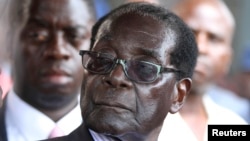The Southern African Development Community says more than 70 percent of people in southern Africa are living below the poverty datum line as nations in the regional bloc are exporting unprocessed goods resulting in economic slowdowns in these nations.
This came out Wednesday during the SADC Extra Ordinary Summit of heads of state and government held in Harare.
Officiating at the opening of the SADC Extra-ordinary Summit focusing on industralization, SADC chairperson and president of Zimbabwe, Robert Mugabe, said southern Africa is losing a lot of money by exporting raw materials.
Mr. Mugabe said it is imperative to reverse this trend in order to achieve self-sustaining development in the SADC region.
“By exporting our natural resources in their raw form, we are not only earning marginal benefits from them, but are, in essence, compromising our efforts to create jobs, or diversify our products, or even develop our industries, and are ultimately, exposing our economies to the vagaries of the fluctuations of the global resource markets,” said Mugabe.
Mr. Mugabe said the volume of intra-SADC trade remains very low notwithstanding the regional bloc’s efforts to boost trade within southern Africa through the Free Trade Area.
The SADC chairman said import figures between SADC countries and the Asia Pacific region account for 45 percent while with the European Union it stands at 27 percent.
He said it was saddening that imports from within the region are a paltry 10 percent, with raw materials and semi-processed goods accounting for the bulk of the exchange.
Mr. Mugabe said SADC should come up with an industrial policy that prioritizes value addition and beneficiation.
“It is, therefore, evident that our focus on reducing and eliminating tariffs has not brought about the intended socio-economic development and well-being of our people. There is, therefore, need for collective action on our part to put in place effective strategies to boost the productive capacity of our industries.
“Enhanced productive capacities will enable our industry to reap the benefits from the market opportunities created by trade liberalization,” he said.
Meanwhile, SADC’s executive secretary, Stergomena Lawrence Tax, said re-industrializing economies in southern Africa would help in revitalizing the region’s economy.
“In order to achieve the feat we have set for ourselves, it is clear that the region is embarking on a long-term project of economic and social transformation, to be supported by concerted efforts, and commitment during the three-phased duration of 2015-2063.
“Our goal as a region is clear, that is, to ensure the realization of the strategy’s target of progressively higher rewards in income, employment and broader social well-being,” said Lawrence Tax.
However, Levy Kadenge, president of the Zimbabwe Economics Society, said this can only be achieved if governments in southern Africa embraced policies that attract foreign direct investment.
At the end of the summit, the SADC leaders are expected to come up with a plan that would ensure re-industrialization in southern Africa.
Leaders attending the SADC summit for the first time since their election into office are Zambian President Edgar Lungu, Mozambican president Filipe Nyusi, Namibia’s Hage Geingob and Lesotho’s Prime Minister Pakalitha Mosisili.
The SADC Extra Ordinary Summit that ends Wednesday evening is being held under the theme: “Regional Strategy and Roadmap for Industrialization”.
The meeting was held under the watchful eye of anti-riot police who surrounded the venue of the meeting following Tuesday’s anti-Mugabe protests. The protestors called for free and fair elections and for the veteran leader to step down for allegedly pushing Zimbabwe’s economy into the abyss.
Some people, who spoke to Studio 7, claimed that the Harare government repaired some of the once potholed roads that are being used by the SADC leaders in an effort to portray an image that all is well in Zimbabwe.
In a communique after the meeting, President Jacob Zuma briefed the SADC Summit on the recent attacks against foreign citizens, including those from SADC member states that occurred in parts of Durban and Johannesburg communities of South Africa.
While condemning the attacks, the summit commended the measures that South Africa “has put in place and resolved to work together to deal with the situation and ensure it does not recur.”





